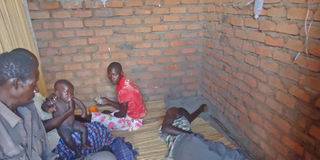Tisai: Island with no government health unit

Patients receive treatment at a private clinic on Tisai Island in Kumi District. PHOTOS BY GEORGE MURON
What you need to know:
- Besides the difficulty the residents find in travelling to and from mainland Ongoni, accessing most parts of Tisai is hampered by poor roads
- Those who opt to go to Kumi mainland complain that the boat fare is, in the long run, high.
Kumi. A narrow water inlet sandwiched on either side by lush marshes leads you from Ongoni Sub-county to Tisai Island in Kumi District.
It is a 30-minute sail from mainland Ongino to Tisai, the source of milk and charcoal for Kumi Town.
While one is on the shores, he or she might be tempted to think all is well on the island.
But as they draw closer, they hear stories of mothers who have died during labour, people living with HIV/Aids whose health has deteriorated due to absence of ARVs. The island has about 4,000 residents.
Besides the difficulty the residents find in travelling to and from mainland Ongoni, accessing most parts of Tisai is hampered by poor roads.
The footpaths there are mainly created by cattle when they leave kraals for the grazing lands.
Many mothers in Tisai, such as 30-year-old Jessica Ipupu, have delivered at the hands of traditional birth attendants (TBAs).
However, having been attended to by TBA, Ipupu missed out on timely immunisation for her children, which she would have got had she given birth at a government health centre.
“Due to the difficulty in reaching Ongino for antenatal services, when we experience labour pains, we rush to our traditional birth attendants,” Ipupu says.
“I am lucky to have given birth to all this six children without any incident.” She adds that some mothers have had life-threatening incidents while being attended to by TBAs.
“My sister was a victim in 2015. [Later,] she had to undergo an operation at Atutur Hospital. She has since then been advised not to conceive anymore,” Ipupu says.
Ipupu says the government should fulfil its pledge to establish a health centre on the island. Such tales are a concern for every mother on the island.
Beatrice Apio, 40, a mother of eight, told Daily Monitor that babies delivered in the hands of TBA have missed out on early immunisation.
Ms Apio adds that many expectant women do not go for antenatal care services because of transport.
“The health centre that the government promised us should be given priority in order to save mothers in Tisai,” she says.
Private makeshift health units are mushrooming because of the lack of a government-aided health facility on the island. Accessing this treatment comes at a cost.
When this newspaper visited one such unit, it found Richard Otelu lying on papyrus mat as he took a drip. Otelu is suffering from malaria.
“Regardless of the state of this private health unit, for every malaria admission, we part with Shs30,000. This is expensive for me who solely depends on farming,” he says.
Mr Otelu says in case they do not have money to buy anti-malaria drugs, patients take herbs.
According to the LC II chairperson of Tisai Parish, Mr Patrick Ochen, women have to use boats to reach Ongino. Some end up delivering while in the boats.
“It is not strange delivering at hands of traditional birth attendants or in the middle of boat rides. But some of babies have ended up contracting HIV/Aids from their mothers,” Ochen says.
Challenges
Ochen adds that for two years now, the residents have not had HIV/Aids outreach services. As a result, many cannot access medication.
Those who opt to go to Kumi mainland complain that the boat fare is, in the long run, high.
James Peter Alutia, who is living with HIV/Aids, says ever since Ongino and Kumi hospitals stopped their HIV/Aids outreach programmes, the increase of viral load has claimed lives of some of his colleagues.
“Opportunistic infections like tuberculosis are taking toll on us,” he adds.
Mr John Wilson Oleimo, the speaker of Ongino Sub-county, says the government is aware of the island’s problems.
Mr Oleimo says the continued lack of health and education services shows the lack of will either by the district or the government to address the islanders’ suffering.
However, Dr John Opolot, the district health officer, attributes the problem to poor transport, saying: “Without engines [for] boats, doctors cannot travel to the island.”
The LC5 chairperson, Ms Christine Apolot, says Uganda National Roads Authority should improve the transport means to the island.
[email protected]




